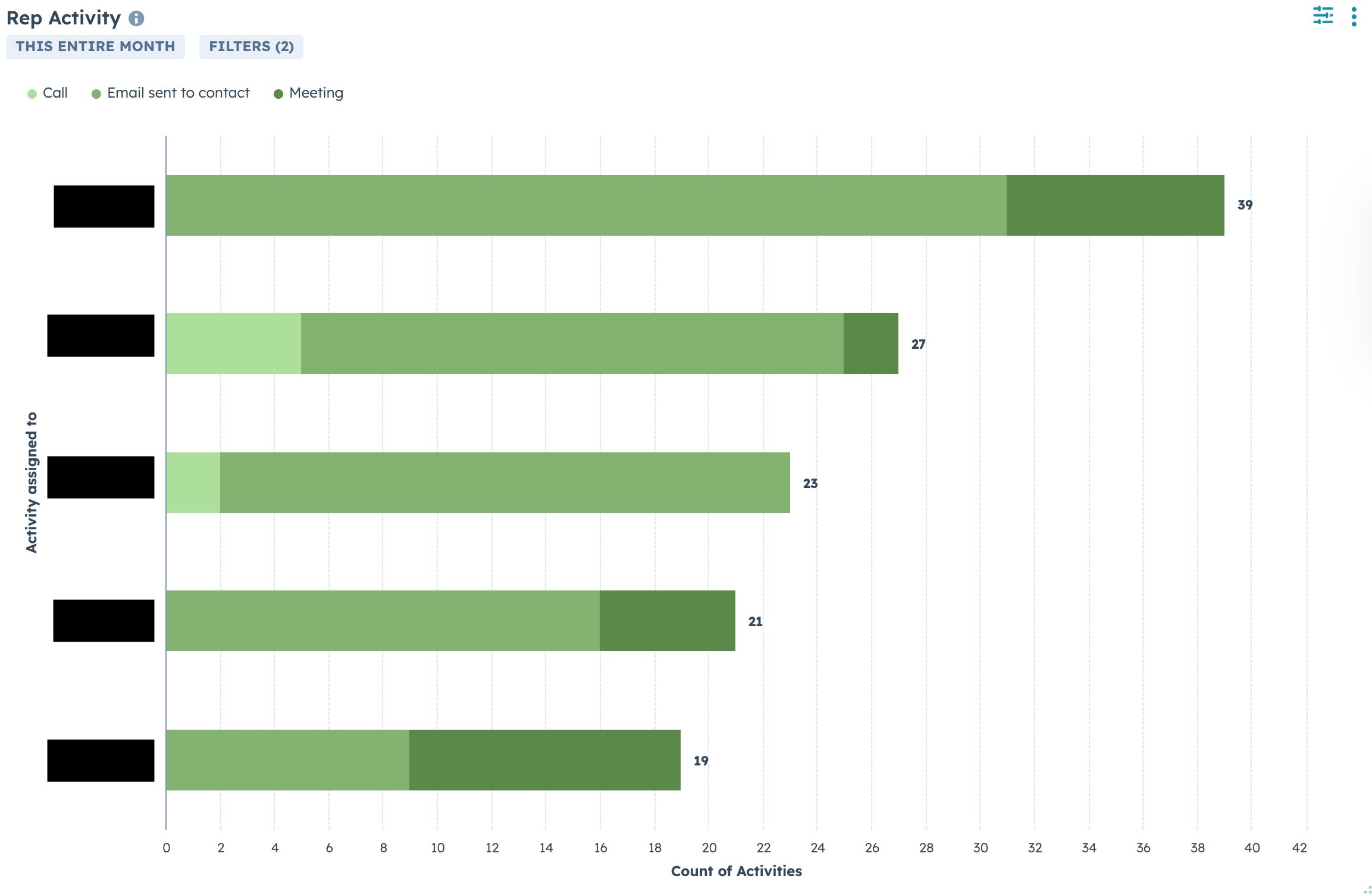Closed-Lost Reasons: Turn Rejections into Landscaping Sales Wins

Closing rates are only part of the picture. As a landscaping company, you may know how many jobs you won this year and how many proposals you sent, but more insightful data is often out of reach.
Your landscaping sales team spends a lot of time nurturing prospects through the process. Proposals often take hours (even days) to prepare. The last thing you want is a leaky pipeline with no idea how to plug its holes.
Why are deals not closing? Are there any trends and, more importantly, is there anything you can do to improve your results going forward?
This is why tracking reject reasons can help you gain valuable insight on how to fix your process and train your team.

Today, we’re sharing how our clients use HubSpot to track and visualize this data so they can make smarter decisions for their landscaping business.
Image Sources: Level Green Landscaping and Monarch Landscape Management
Bonus: We have an interactive calculator later in this article! See what happens if you improve your closing percentage!
Starting with Lead Qualification
You should only pursue leads worth your time and resources.
This 5-point qualification checklist for the BANT+P method can help your team consider if a lead is worth their time.
- Budget: Does the prospect have a reasonable budget for the work they require?
- Authority: Are you talking to the decision-maker(s)?
- Need: Does the prospect truly need your services, or are they just window shopping?
- Timing: Are their expectations for service delivery aligning with your sales process and production timeline?
- Positioning: Does this client and the services they require align with your ideal client profile?
Once you've properly qualified your leads, the next step is to track how they move (or don’t move) through your sales pipeline.
Creating a List of Deal Closed-Lost Reasons
There are multiple reasons why conversations end without signing on the dotted line. Instead of diving into every single one, we’ve compiled a general list of possible causes for rejection.

Some of these issues can be tackled in your marketing or on your website. However, many of them lead to potential sales processes and coaching improvements.
- Out of Area: Contact is not in your service area.
- Service Not Offered: Prospect wants a service you don’t provide.
- Unable to Contact: The prospect submitted a form or called but was not reachable.
- Competitor: Another provider responded first or gave them a better deal.
- Price: Prospects don’t feel the value of what you provide is aligning with what they are willing to pay.
- Changed Mind: The initial interest fizzled out.
- Under Minimum: Prospect wanted a project under your minimum level of engagement
- Unrealistic Timeline: They wanted the project done too quickly.
- DIY: They chose to tackle the job themselves.
This list can be much longer, and every company may have its own unique set of challenges. The key is tracking these rejection reasons systematically to understand recurring patterns.
[RELATED READING: Ditching Spreadsheets for Better Landscaping Sales Management Tools]
Require Deal Closed-Lost Reasons Within a Set Timeframe
HubSpot can make a deal Closed-Lost reason a required property. So, for a sales associate to close out a deal, they must first select one of the pre-selected reasons.
This is great when deals are actually moved to Closed-Lost, but what about stalled deals that just sit in a previous stage? You can’t trust your metrics if your sales pipeline is clogged with deals that should be closed out or reassigned.

Reps often leave deals sitting in the Estimate or Proposal Sent stage with hopes they will convert at a later date because the lead was qualified and seemed interested. But sometimes it is best to cut your losses and follow up at a later date.
HubSpot can also be configured with triggers that alert sales managers when a deal is sitting at a certain deal stage for a set amount of time and create a task for the assigned deal owner to follow up.
A Few Landscaping Sales Scenarios
To better analyze rejected deals, it’s important to break down the reasons for rejection by the individuals or teams involved. This can help pinpoint where the problem lies in the process, whether it's with a specific role or across the entire organization.
The Landscape Designer's Perspective
As you analyze closed lost trends, you may have conversations where a designer tells you that the prospects lost interest after they presented their initial design and it was marked lost due to “Changed Their Mind”.

Image Source: Outback Landscape
Here are some potential causes:
- Perhaps the designer isn’t properly qualifying the prospect before the design stage.
- Proposals may not be resonating with the prospect’s needs or preferences.
- Follow-up communication isn't strong enough to maintain their interest.
HubSpot also includes features that can address these challenges by utilizing:
- Playbooks: Required forms that collect information about the prospect and opportunity
- Email Workflows: A series of automated emails triggered by particular pipeline stages, adding value and keeping interest warm.
- Activity Tracking: Lead intelligence for reps to see how prospects are engaging with emails, proposals, and website pages.

These trends can also identify specific coaching opportunities for your sales manager.
The Account Manager’s Struggle
Account managers may face numerous reasons for deals not closing. Perhaps they have a client that is interested in an enhancement project. The prospect eventually goes dark and the deal is lost with the “Unable to Contact” reason.

Image Source: KD Landscape
Here are some potential causes:
- Communication dies after several rounds of playing email and phone tag to set up a meeting.
- The account manager forgets to reach back again as they’re spending time with hotter opportunities.
- The rep is taking too long to respond to the contact and they lose interest or complete the project themselves.
Here are some potential fixes HubSpot can provide:
- Meeting Links: Sends the prospect a direct link to the rep’s calendar to book a time to walk the property together.
- Sequences: A custom group of emails, call reminders or tasks for this specific use case.
- Activity Reports: Dashboards that show how long it takes for a rep to initiate outreach.
As always, identifying these Closed-Lost trends can provide coaching opportunities.
Leveraging Data for Continuous Improvement
The data from rejected deals is valuable because it provides a clear starting point for improvements across the board. Here's how to make the most of this information:
- Prequalify leads more effectively: Use insights from rejected deals to refine your lead qualification criteria. This could mean adjusting your marketing strategies.
- Review your sales process: Regularly assess your team’s approach to selling. Are there patterns in how certain team members handle rejections? Could better coaching, additional resources, or better technology help close more deals?
- Coach team members: Armed with data from rejected deals, you can provide targeted coaching to individuals. Your team may need additional support in proposal development, establishing rapport, or uncovering needs.

Image Source: Lawn & Pest Solutions
The key is to view each rejection as an opportunity for improvement. By analyzing the trends in why deals are lost, you can continually fine-tune your sales processes, train your team better, and ultimately close more deals.
Proposal Closing Percentage Calculator
Use this calculator to analyze your proposal closing percentage and see how improving it could impact your revenue.
- First, enter your current sales scenario and hit "Calculate".
- Review your results below, paying attention to closing %.
- Then, enter what your desired closing % should increase to, and see the potential results if you improved your rate.
Results:
Average Proposal Value: $0.00
Closing Percentage: 0.00%
Adjusted Revenue: $0.00
Revenue Increase: $0.00
Turn Rejected Deals into Future Wins
Rejected landscaping deals don’t have to be the end of the road. With a solid pre-qualification process, an understanding of why deals are lost, and a data-driven approach to improving your sales strategy, you can reduce these rejections and turn them into opportunities for future success.
If you like regular insights like these, subscribe to our blog. We'll send you new articles right to your inbox. If you're ready to streamline and automate your landscaping sales process, feel free to request a consultation.






